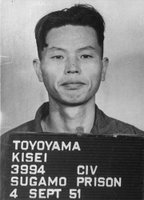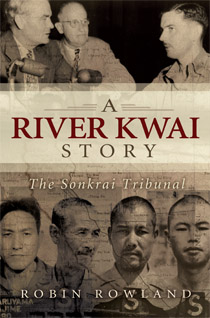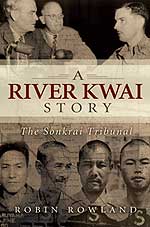Paul Begla, in the Huffington Post, writes Yes National Review, We did execute the Japanese for waterboarding.
Begala is responding to an assertion by Mark Hemingway of National Review Online that U.S. did not execute the Japanese.
The problem with that debate is that it is apparently based on only one case, that of Yukio Asano, and that debate is based only on the online summary of the trial. Apparently it's too much in this internet age to have a debate on the substance of a matter of national and international importance based on the facts or substantive research, just what you pick up on the web. (And these are older adults, so why are we boomers complaining about kids basing their school work on Wikipedia? We have here role models for Wiki-searching from both sides of the polarized American political spectrum.)
There is the usual American parochialism, that it only counts, apparently, if an American was waterboarded or if the Americans executed war criminals for waterboarding. To many Americans, and almost all American conservatives, not only on the Huffington Post or the National Review Online, but on other blogs, that the British tried the Japanese for waterboarding is of little or no importance.
That's why it's called International Humanitarian Law (A lot of the evidence against the Japanese for torture in the Double Tenth case, which was a British military tribunal, came from American war crimes investigators.)
Finally there's a double anonymous comment on the Huffington Post in response to Begala. From an anonymous poster calling himself The Golden Master, quoting an equally anonymous so-called close assosicate who apparently says:
In the first place, I had studied, written, and; 'published' on the Tokyo War Crimes Trial, but I've never come across information that the Japanese waterboarded their captives, even less that Japanese war criminals were executed for waterboarding. So, Paul Begala has no credibility unless he produces his source(s) for that assertion.
Obviously whomever this person is has never actually checked the index to the published edition of the transcript of the hearing of the International Criminal Tribunal for the Far East, for the "water treatment" is easy to find.
I quoted from the trial in my original post
This form of torture was not limited to Singapore. The judgment of the Tokyo war crimes trial said “the water treatment was commonly applied…there is evidence that this torture was used in the following places: (spelling in the original)
China, at Shanghai, Peiping and Nanking
French IndoChina, at Hanoi and Saigon
Malaya, a Singapore
Burma, at Kyaikto
Thailand, at Chumporn
Andaman Islands, at Port Blair
Borneo, at Jesselton
Sumatra, at Madan, Tadjong Keareng and Palembang
Java, at Batavia, Badung, Soerabaja and Buitonzorg
Celebes, at Makeskar
Portuguese Timor, at Orzu and Dilli
Philippines, at Manila, Nichols Field, Palo Beach and Dumquete
Formosa, at Camp Haito
Japan, at Tokyo"
The online debate was triggered by this "discussion" on CNN's Anderson Cooper.
There is also Andrew Sullivan's response to Hemingway here and to Begala here.
Update:
There's a good summary (and much more intelligent debate) on Mahalo Answers.
Technorati tags
writing, journalism, Burma Thailand Railway, World War II, torture,F Force, Prisoner of War,military tribunal, waterboarding, law, book, CNN, Huffington Post, National Review
Labels: A River Kwai Story, Andrew Sullivan, CNN, F Force, Geneva Convention, Guantanamo, Huffington Post, human rights, Japan, National Review, Singapore, Tokyo trial, torture, waterboarding, World War II
Titled Waterboarding was a war crime in WW2. What's changed? it builds on former U.S. Vice President Dick Cheney's contention that waterboarding was an effective way of getting information.
It links to my 2005 blog, Waterboarding is a war crime as well as stories in the Times about POW Eric Lomax and a letter to the Times from General Sir Arthur Percival marking the death in a plane crash of Cyril Wild. (Note to read letter you must accept popups from Times Online)
See also a second link from the Times on "humane" torture by the French in Algeria.
Technorati tags
writing, journalism, Burma Thailand Railway, World War II, water boarding,F Force, Prisoner of War,
military tribunal, torture, Times, book
A River Kwai Story, France, Double Tenth, Japan
Labels: A River Kwai Story, archives, Bridge on the River Kwai, Burma Thailand Railway, F Force, Guantanamo, Times, torture, water torture, waterboarding, World War II
 A River Kwai Story: The Sonkrai Tribunal was officially published on April 4, 2008 by Allan and Uwin in Australia. The publisher is distributing the book in Australia, New Zealand and parts of the western Pacific. Allan and Unwin also has non-exclusive rights to distribute the book in Asia.
A River Kwai Story: The Sonkrai Tribunal was officially published on April 4, 2008 by Allan and Uwin in Australia. The publisher is distributing the book in Australia, New Zealand and parts of the western Pacific. Allan and Unwin also has non-exclusive rights to distribute the book in Asia.So far I haven't been able to sell rights in North America, the United Kingdom and Europe.
No matter, in the age of the Internet, the book is available online almost everywhere! (See below)
A River Kwai Story is a project that has taken almost eight years, but I was planning it for almost a decade, if not more, before that.
My father was a prisoner on the railway of death and so I heard his stories at the breakfast table. He also bought any book he could on the railway, most of the POW memoirs that were published following the success of David Lean's movie The Bridge on the River Kwai.
I really began work in the summer of 2000, when I was admitted to the interdisciplinary masters program at York University in Toronto.
Although my father was part of the group known as "H Force," when I was reading the memoirs my father had bought, I had a gut feeling that "F Force," the events at Sonkrai, was the key to understanding what happened on the Railway of Death. My gut feeling was confirmed when, as part of the interdisciplinary program, I began studying international humanitarian law and found out that the story of F Force not only had some of the most fascinating characters of the Second World War, but was also a little known but key case in the concept of command responsiblity for war crimes.
As I entered the second year of the part time program in September 2001 (I worked for CBC throughout the process and I am still working for CBC News) the attacks on September 11, and the subsequent events in Afghanistan, Guantanamo and Iraq made the story all the more relevant. While the Bush administration was denying that there was a strong legal definition of what constituted "inhuman treatment" of detainees, it was clear that every post-war case in the Far East, including the cases tried by the United States, clearly defined "inhuman treatment."
After I graduated from the MA program in the fall of 2003, I turned turning the academic thesis into a book. I thought it would take a year. It took four. There were delays in getting additional material to flesh out the academic thesis, to write the book as world events kept me busy at my job and then there were some delays in the production process at the Australian publisher.
Now it's available for you to read:
International orders for A River Kwai Story The Sonkrai Tribunal
Updated August 2008
Outside of Australia and New Zealand, the best way to order this book is through a book store that resells through Amazon.com.
A River Kwai Story page on Amazon.com.
(Note this link does not operate from either Amazon.ca or Amazon.co.uk, if you want to order you must go through Amazon.com.)
Technorati tags
writing, journalism, Burma Thailand Railway, World War II, Iraq,F Force, Prisoner of War,
military tribunal, law, book
Labels: A River Kwai Story, Burma Thailand Railway, F Force, Geneva Convention, Guantanamo, Singapore, war crime, World War II, writing
Although many legal experts who have been discussing the case of Blackwater USA, the private contractor now being investigated for a shootout in Baghdad, say private contractors are in legal limbo, accountable to neither government nor laws, there is yet another episode from the Second World War in the Far East that is relevant to the modern world.
The guards in the River Kwai prison camps were gonzoku, private contractors employed by the Imperial Japanese Army. Many were tried as war criminals after war, including two of the defendants in A River Kwai Story.
Link to my story for CBCnews.ca
Private military contractors subject to rule of law
Second World War gonzoku provide precedent

One of the main characters in A River Kwai Story is a Korean gonzoku or civilian contractor named Hong Ki-song, also known by his Japanese name Toyoyama Kisei, who was one of the most hated guards on the Burma Thailand Railway, and was notorious for beating prisoners of war with the shaft of a golf club. Toyoyama, who volunteered for the duty, was sentenced to death by a British military court in Singapore. That sentence was later commuted to life imprisonment. This mug shot was taken by the U.S. army in Sugamo Prison in Tokyo. (U.S. National Archives)
Technorati tags
writing, journalism, Burma Thailand Railway, World War II, Iraq,F Force, Prisoner of War,
military tribunal, Blackwater, law, book
Labels: A River Kwai Story, Burma Thailand Railway, CBC, F Force, human rights, war crime, World War II, writing
Link to Doubleday Book Clubs in Australia.
Labels: A River Kwai Story, Australia, Burma Thailand Railway, F Force, Singapore, World War II
In late August, I appeared on a history program on Radio Singapore International called Retrospect to discuss with host Mubin Sadat the history of the Burma Thailand Railway and the new information that will appear in the book A River Kwai Story The Sonkrai Tribunal when it appears in April 2008.
You can listen to the podcast here
Note: If the podcast doesn't download or play automatically, in Windows you can right click, save target as (Explorer) or save link as (Firefox) and then play from your hard drive with any player.
A River Kwai Story The Sonkrai Tribunal main page (includes online ordering information)
Technorati tags
writing, journalism, Burma Thailand Railway, World War II, Australia,F Force, Prisoner of War,
military tribunal, Singapore, POW, Retrospect, Radio Singapore International,podcast,book
Labels: A River Kwai Story, Australia, Burma Thailand Railway, Canada, F Force, Japan, Myanmar, Singapore, war crime, World War II, writing

Here is the cover of A River Kwai Story The Sonkrai Tribunal.
Publication date is Friday, July 6, 2007.
More prisoners of war died at Sonkrai than any other camp on the infamous River Kwai Railway. The seven thousand Australian and British prisoners of war who comprised
F Force were sent by the Japanese to build the toughest section of the railway in the mountains between Thailand and Burma. More than three thousand people died from slave labour, disease, starvation and exposure to the never-ending monsoon rain.
In 1946 seven former guards from the infamous River Kwai camp were put on trial for their lives before a military tribunal in Singapore, charged with the deaths of more than three thousand people. The account of the trial tells for the first time the story of F Force from all sides-Australian, British and Japanese-from the lowest private to the lieutenant colonels in command. The testimony, verdict and the surprise sentence shed new light on what really happened on the Railway of Death.
You can view the Allen and Unwin July books international sales page here.
Technorati tags
writing, journalism, Burma Thailand Railway, World War II, Australia,F Force, Prisoner of War,
military tribunal, Alberto Gonzales, POW, book
Labels: Alberto Gonzales, Allen and Unwin, Australia, Burma Thailand Railway, F Force, publishing, Singapore, war crime, World War II




